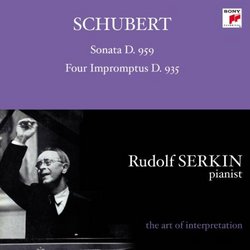| All Artists: Franz [Vienna] Schubert, Rudolf Serkin Title: Schubert: Sonata D. 959; Four Impromptus, D. 935 Members Wishing: 0 Total Copies: 0 Label: Sony Bmg Europe Original Release Date: 1/1/2003 Re-Release Date: 9/1/2003 Album Type: Import, Original recording remastered Genre: Classical Styles: Chamber Music, Forms & Genres, Sonatas, Historical Periods, Classical (c.1770-1830), Romantic (c.1820-1910) Number of Discs: 1 SwapaCD Credits: 1 |
Search - Franz [Vienna] Schubert, Rudolf Serkin :: Schubert: Sonata D. 959; Four Impromptus, D. 935
 | Franz [Vienna] Schubert, Rudolf Serkin Schubert: Sonata D. 959; Four Impromptus, D. 935 Genre: Classical
|
Larger Image |
CD Details |
CD ReviewsGREAT BEYOND ORDINARY GREATNESS DAVID BRYSON | Glossop Derbyshire England | 02/06/2004 (5 out of 5 stars) "Occasionally a record strikes me as being one of the final towering peaks of recorded music, and this is one of those records. Serkin was difficult to record, and not just in the sense that he was a terrible old fusspot who kept blocking the release of his own records on the grounds that he could do the pieces better. The difficulty was in capturing his highly individual tone-quality, in particular in coping with his enormous dynamic range, and above all in handling his near-unbelievable fortissimo. The more successful efforts by and large duck the problem by simply constricting the dynamic extremes, which at least prevents distortion but denies us some of the things that made Serkin so completely unique, like the left-hand crescendo in Diabelli's theme from Beethoven's variations, surely the most phenomenal increase in tone there can ever have been in the space of five notes. I would put this record in this `more successful' category by and large. The tone is rather clangorous in the first few bars, but it soon improves. My imagination is having to reconstruct what the tone-contrasts were really like (I never heard him live in this piece but I heard his Hammerklavier and have lived to tell the tale), but enough of them survives to put this great record of this great piece in a class of its own. It is not a piece that wants for fine, even great, performances. My own collection also includes Brendel, Lupu and Zacharias, and by great good fortune I heard Pollini broadcast just the other day. And not one of them even touches Serkin. More than anything else, I suppose it's a matter of the sheer bigness of this reading. Schubert had, in my own personal opinion, the greatest purely musical gift that any man ever had. When his genius is operating at full stretch, as in this work, he generates more sheer power than even Beethoven can do, because less of it comes from his own efforts and more of it from something or someone outside above and beyond. This is the Schubert you will get from Serkin here. He is very careful, as Zacharias also is, not to let the theme of the last movement suggest one of the mill-songs as it easily could. In the slow movement he is not alone in conveying memorably the weary trudging Winterreise feel, but nobody, not even Pollini, does the frightful hysterical up-and-down rush in the central episode quite like Serkin. This is largely a matter of rhythmic sense, and I offer my personal view that in the matter of rhythm and timing Serkin was as unique and unapproached as Michelangeli was in the matter of tone-quality. The sublime rhythmic subtlety pervades the whole performance. It is there in a brilliant, arrogant, account of the scherzo that makes all the others sound underpowered. It is there above all in the great first movement, where his steady unhurried march is in danger of making everyone else sound trivial. The makeweight is the op 142 impromptus, in fact the first thing I ever heard him play in real life. They are very fine to my way of thinking, although he did a far better #4 in his spectacular 1957 recital from Lugano. In these pieces I know so many performances that I would not even know where to start in making a recommendation. You will find a certain amount of the unique Serkin in his playing here, especially in the highly imaginative #1 where he uses his left hand to produce an unusual melodic line in the `duet' theme, and where I hear some strange harmonies at one point that I must have been hearing, indeed playing, all my life without realising how strange they are. I am sure that by now I have made it clear that I recommend this record." Me, too Charles Sanders | Savannah, GA | 08/17/2004 (5 out of 5 stars) "I have been waiting for this particular recording on CD for 2 decades, having owned it earlier on lp. (Like Mr. Bryson above, I heard Serkin in person play the Beethoven 29th and am still alive.) I can add little to the excellent review Mr. Bryson has given: this is the only recording that gets the Schubert tempo right in every movement, comparing and contrasting the overwhelming diversities in range, tone, sudden shifts from a kind of insanity of despair to the torment of joy. It is foolish of me to select any part as outstanding, but my greatest satisfaction is with the last movement, which no one else (no matter how great or greater in general) does to my knowledge to reveal its natural essence. "Words move, music moves / Only in time; but that which is only living / Can only die. Words after speech / Reach into the silence. . . .""
|

 Track Listings (8) - Disc #1
Track Listings (8) - Disc #1